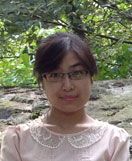WANG Fang

WANG Fang
Address: Letterbox 338, 550 Dalian Road (W), Shanghai 200083, China
Email:wangfang@shisu.edu.cn
Phone: (+86-21) 35372267
Employment:
9/2012- present Assistant Professor, Institute of Linguistics, Shanghai International StudiesUniversity
Education:
9/2009-7/2012 Nankai University, Ph.D. in Linguistics
6/2011-12/2011City University of Hongkong, Linguistics, Visiting Doctoral Student
9/2006-7/2009 Soochow University, M.A. in Linguistics
Research Interests:
Linguistic Typology, Chinese Linguistics
Publications:
Jin, L. & Wang, F. 2015. Lexical classes. In Lu, B. & Jin, L. (eds.).Yuyan Leixingxue Jiaocheng (An Introduction to Linguistic Typology). Beijing: Peking University Press. 56-81.
Jin, L. &Wang, F. 2015. Semantic maps. In Lu, B. & Jin, L. (eds.).Yuyan Leixingxue Jiaocheng (An Introduction to Linguistic Typology). Beijing: Peking University Press. 260-281.
Wang, F. 2014. Factual conditionals in Mandarin Chinese. HanyuXuexi (Chinese Language Learning), (2): 56- 64.
Wang, F. 2013. On the category of possession in the Guangshan dialect, YuyanYanjiuJikan (Journal of Linguistic Studies), (10): 177- 193.
Bai, G., Liu, D.,Wang, F., & Yan, Y. 2012. The procliticization of the pronoun ren in Beijing Mandarin and other Northern dialects, YuyanKexue (Linguistic Sciences), (4): 377- 386.
Wang, F. 2012. A Review of The Genesis of Syntactic Complexity, Nankai Yuyan Xuekan (Nankai Linguistics), (2): 166- 174.
Wang, F., & Liu, D. 2011. The multifunctional word de originating from li in the Guangshan dialect: Synchronic description and semantic evolution. Yuyan Yanjiu (Studies in Language and Linguistics), (2): 8-16.
Teaching:
Linguistic Typology (graduate-level course), Autumn 2014, Autumn 2015
Functional Grammar (graduate-level course), Spring 2013

